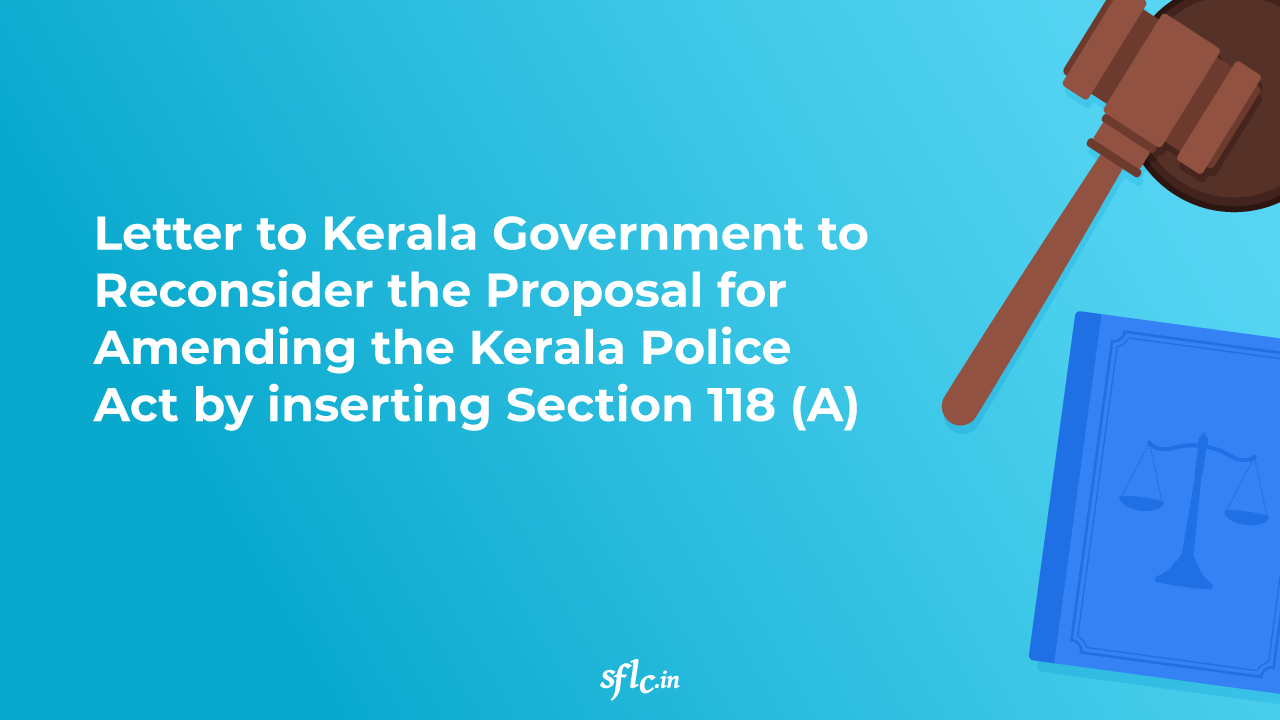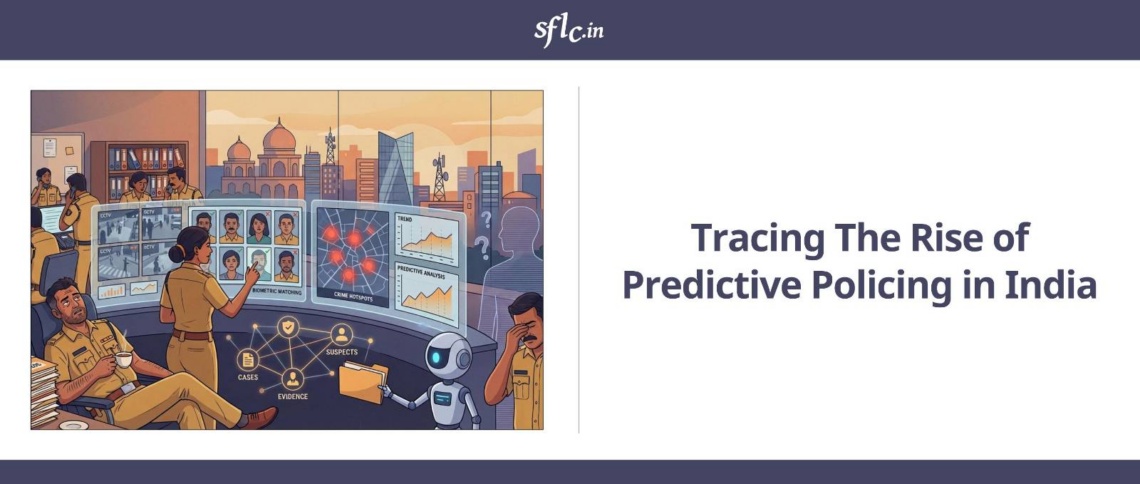Letter to Kerala Government to Reconsider the Proposal for Amending the Kerala Police Act by inserting Section 118 (A)
SFLC.in sent a letter to the Chief Minister of Kerala in reference to the press release dated 21st October 2020 regarding the amendment to the Kerala Police Act, 2011. The said press release states that Kerala Police Act will be amended by inserting Section 118(A) aimed at curbing cyber bullying. The said amendment seeks to impose a fine of 10,000 rupees or a jail term of 5 years or both to any individual who threaten, insult or harm the reputation of an individual through any means of communication. The provision enables crimes to be registered suo moto or by any individual. The wordings of the section suggest that this can be applicable not only to posts on social media but also mainstream media.
We believe that the said amendment if passed can cause a chilling effect on Freedom of Speech and Expression in the
state. The proposed amendment can be used by law enforcement agencies to curb dissent and to clamp
down on legitimate criticism of authorities and individuals.
The letter sent to Sri. Pinarayi Vijayan, Chief Minister of Kerala, can be found below:
Via electronic mail communication
24th October 2020
To
Sri. Pinarayi Vijayan,
Chief Minister of Kerala,
North Block, Secretariat,
Thiruvananthapuram
Dear Sir,
Subject – The proposed Kerala Police Amendment Act – Request to reconsider
This is in reference to the press release dated 21st October 2020 regarding the amendment to the Kerala Police Act, 2011. The said press release states that Kerala Police Act will be amended by inserting Section 118(A) aimed at curbing cyber bullying. The said amendment seeks to impose a fine of 10,000 rupees or a jail term of 5 years or both to any individual who threaten, insult or harm the reputation of an individual through any means of communication. The provision enables crimes to be registered suo moto or by any individual. The wordings of the section suggest that this can be applicable not only to posts on social media but also mainstream media.
The said amendment if passed can cause a chilling effect on Freedom of Speech and Expression in the state. The proposed amendment can be used by law enforcement agencies to curb dissent and to clamp down on legitimate criticism of authorities and individuals.
The press release refers to the judgment of the Supreme Court in Shreya Singhal V. Union of India that held Section 66A of the Information Technology Act, 2000 and Section 118(d) of the Kerala Police Act as unconstitutional and violative of Article 19(1)(a) of the Constitution of India. The Hon’ble Court held that “Section 66A arbitrarily, excessively and disproportionately invades the right of free speech and upsets the balance between such right and the reasonable restrictions that may be imposed on such right”. Section 66A as well as Section 118(d) of the Kerala Police Act were struck down as the terms used were open-ended and undefined making the statute void for vagueness.
The proposed provision is vague and could prove to be more problematic than Section 66A of the IT Act. The already existing provisions in the Information Technology Act as well as Indian Penal Code are sufficient to solve the menace of derogatory remarks made against individuals on social media. Sections 499 and 500 of the Indian Penal Code provides for relief against defamation. Most modern democracies that cause a negative impact on free speech.
Defamation as per Section 499 of the IPC is a non-cognizable offence and a law enforcement agency can take congnizance of the offence only after getting permission from the Court. Section 499 also has various exceptions that act as checks from indiscriminate use of the provision. On the other hand, the proposed section is problematic with no exceptions provided. Also, the proposed amendment could make the offence non bailable and cognizable which is gravely concerning. We are also concerned that the said amendment will prove to be harmful to media freedom in the state.
We would like to strongly urge the Government of Kerala to rethink the amendment and not to notify it in the current form. We would recommend that the existing provisions in the Information Technology Act, 2000 as well as the Indian Penal Code, 1960 are sufficient to curb the menace of derogatory and defamatory social media posts. Imposing criminal sanctions against free speech offences will end up curbing dissent as well as media freedom. As a modern progressive democracy, Right to free speech and expression forms the spine of the democratic rights. We request you to have a broader consultation before introducing any law that affect the fundamental rights of citizens.
SFLC.IN is the first Indian legal services organization that works exclusively on technology, law, and policy. As a not-for-profit organization engaged in the empowerment of Indian citizens about their digital freedom and rights, it operates as a collective bringing together different stakeholders to a common platform to further the cause of digital rights. SFLC.in promotes innovation and open access to knowledge by helping policy makers make informed and just decisions regarding the use and adoption of technology. As of 2020 SFLC.in is the only Indian organization to be inducted as a member of the IFEX, a global network to defend the right to freedom of expression and information.
Kerala has been a model to other states by declaring Internet as a basic human right and coming out with plans to improve Internet access in the state. We once gain urge the Government to reconsider the proposal for amending the Kerala Police Act by inserting Section 118 (A).
Yours sincerely,
Prasanth Sugathan
prasanth@sflc.in
Legal Director
SFLC.in
Copy to:
Sri.A.K.Balan, The Hon’ble Minister for Welfare of SCs, STs and Backward Classes, Law, Culture and Parliamentary Affairs




